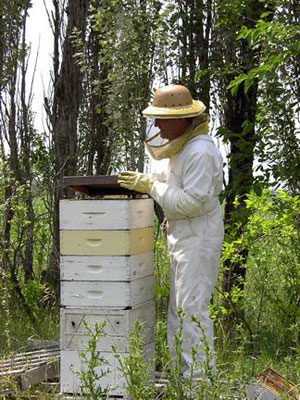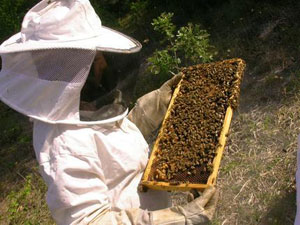Beekeeper
Tasks & duties

Beekeepers' tasks vary depending on the season. In spring (breeding season) they:
-
check the food supply, health and laying ability of the queen bee
-
check beehives to prevent swarming
-
breed replacement queen bees
-
provide a pollination service by renting hives to orchards and farms
-
collect the hives when the flowering period is over
In summer they:
-
visit apiaries and place boxes on hives to prepare for honey production
In autumn (harvest time) they:
-
shake bees off combs or use a blower and collect the honey
-
extract honey from the comb using machinery at the honey house
-
send the honey away in drums for further processing into retail packs
-
store empty boxes away until the next summer
-
may collect other bee products, such as pollen, propolis (an antibiotic gum or resin) and wax
-
may collect and package bees for export
-
feed hives to ensure that they have sufficient food until spring
Throughout the year they:
-
check hives for diseases such as the varroa mite or American foulbrood (AFB)
-
treat hives for the varroa mite, or destroy diseased bees and hives that have AFB
-
inspect hives using hive tools and a smoker
-
build and repair hives, although they mostly do this in winter
-
divide colonies for replacement or increases in bee numbers
-
run the business and keep records
-
repair mechanical equipment
-
test for active honey, which has antibacterial qualities and is used for health reasons
-
may analyse and test micro-organisms or send them away to be analysed
-
may be involved in retailing, processing and packing honey
Skills & knowledge

Beekeepers need to have:
-
thorough knowledge of the yearly cycle and habits of bees
-
good bee-handling skills so they know when and how to approach bees
-
knowledge of plant types and life cycles, and how and when plants produce nectar
-
skill identifying bee disease, and knowledge of methods of disease control
-
knowledge of how to introduce a queen bee into a colony
-
knowledge of how to assess the quality of, and handle bee products such as honey, pollen, royal jelly and propolis (an antibiotic gum or resin)
-
carpentry skills for building and repairing hive boxes
-
mechanical skills for repairing equipment
-
understanding of environmental issues
-
good communication skills
-
ability to drive vehicles and machinery such as trucks, tractors, quad bikes and fork-lifts
They also need to have marketing or business skills if they sell their own products or manage a business.
Entry requirements
To become a beekeeper all that is needed is a natural interest in bees and honey production. However, tertiary courses in beekeeping will improve employment prospects, and are available by full-time study or distance learning.
Many employers require their beekeepers to have a driver's licence and a Heavy Trade (HT) licence so they can drive trucks for shifting hives and carting supplies.
Secondary education
There are no specific secondary education requirements for beekeepers, but useful subjects include maths, biology and science.
Training on the job
Beekeeping skills can be learned on the job. Employers may support their beekeepers to complete Disease Elimination Conformity Agreement (DECA) training, to make sure they can recognise American foulbrood disease. They may also support them to gain heavy trade and fork-lift licences.
Beekeepers keep up to date with developments in the industry by attending conferences, field trips, and reading agriculture magazines.
Registration
Anyone can keep a beehive, but each apiary site must be registered. Some urban authorities may have restrictions on beekeeping in their council areas.
Useful experience
Keeping bees as a hobby, attending beekeeping courses or joining the local beekeepers' club may be a good introduction to beekeeping. Carpentry or other woodworking experience may also be useful.
Related courses
Agricultural Science
Beekeeping
For more information, please refer to myfuture.
Document Actions
